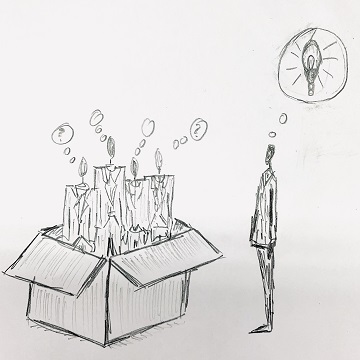
La Palma after the volcano - still breathtaking and beautiful
"La Isla Bonita" - my beautiful island has changed after the huge volcanic eruption in September 2021 - evacuated places, cut off roads and lost crops:

„Very urgent!“ „Extremely urgent!“ „Please do it now!“ - These kinds of „requests“ are already commonplace today - whether justified or not! Fast pace, hectic pace, lack of time? Or just underlining a „special“ importance and urgency? Who does not know that?
In precarious situations, quick decisions are made and quick implementation of measures is required. What was felt good yesterday is already outdated today. Is that the toll we have to pay for permanent change?
Many companies, but also individuals, are now facing profound changes due to this fast pace. For some this is the bare struggle for survival, for others the focus is on optimization, restructuring and personal development.
Why do changes take place at all? In general, the goal of change is to create a “better future” compared to the present, which is perceived as inadequate. Change management is not an end in itself, but the shaping of change. The only question left is: "How can we successfully make changes?"
In any case, the question of the reason for the change should be clarified at the beginning. Both quantitative and qualitative characteristics should be taken into account here. However, the individual experience with changes is decisive, because this has a significant influence on the willingness to change and on the ability to change. In the further course it should be clarified what kind of change it is in order to be able to choose a precise change strategy. It is very important that the content goals are set.
Another very important aspect is the clarification of resources. The involvement of key people in the process is crucial for the success of the desired change. For this reason, it is extremely important to understand change as a social process that brings resistance and conflict. It is important to get through the conflicts and overcome the resistance. The more people affected by the change, the more important early and comprehensive communication with those involved becomes. Dealing with those fears and feelings is extremely important. Uncertainties and the feeling of losing control are very often the result. The reflex reaction to this is mostly rejection in order to restore the threatened or lost freedom of action. If this resistance is not followed, conflicts will arise. These are in themselves not negative, only ignoring them can lead to unproductive power struggles, which in turn can end in crises in an intensified form.
For this reason, it can be helpful to learn from foreign crises in advance, instead of trying to try every mistake yourself. Support through change coaching offers a good opportunity to promote the personal responsibility of those involved right from the start.
The timely integration of change controlling helps to keep an overview and can be optimally used as a control instrument. The continuous review of the milestones makes it an early warning system for the change process.
In summary, it can be said that the following success factors are essential for coping with the change process:
Make affected people involved!
Changes usually fail due to a lack of communication, poor communication and / or communication that started too late. Let’s talk ...
Your Violetta Haag

"La Isla Bonita" - my beautiful island has changed after the huge volcanic eruption in September 2021 - evacuated places, cut off roads and lost crops:

Coaching is a process of 1) awareness, 2) action, and 3) accountability to yourself. Coaching helps you to develop awareness of your strengths. Awareness leads to action.

Simply magical. Simply pure nature. Just BE.